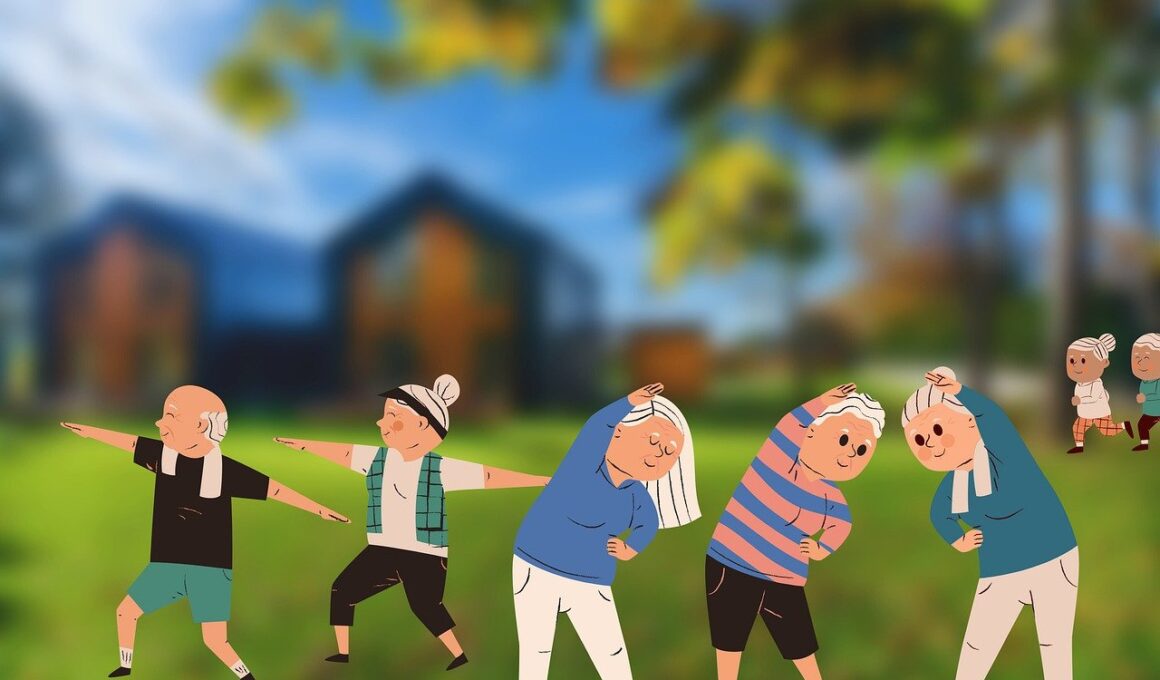The Psychological Benefits of Staying Physically Active in Senior Years
Maintaining physical activity in senior years provides numerous psychological benefits that contribute to overall well-being. Engaging in regular exercise combats feelings of isolation and depression commonly experienced among the elderly. When seniors participate in fitness activities, they often engage with others which fosters social connections, enhancing feelings of belonging and acceptance. Not only does this improve mental health, but it also encourages further participation in community events. Moreover, staying active helps counteract feelings of helplessness or anxiety that can accompany aging. As they experience improvements in their physical capabilities, seniors receive a confidence boost, which significantly elevates their mood. Exercise also serves as a natural outlet for stress relief, enabling older adults to tackle daily challenges more effectively. Additionally, the release of endorphins during exercise contributes to a positive mindset, inspiring seniors to maintain an active lifestyle. Mental stimulation from various fitness routines can enhance cognitive function, providing seniors with a concoction of physical and mental advantages. Keeping the body moving is essential in promoting mental clarity and emotional stability in the later years of life.
Alongside physical exercise, mental engagement through fitness routines is beneficial. When seniors participate in complex activities, such as dance or yoga, they stimulate their minds as well as their bodies. This combination fosters a holistic approach to wellness. Staying active encourages the development of new skills, further enhancing cognitive engagement. The learning process associated with mastering new exercises stimulates the brain, promoting greater focus and enhancing memory. Completing challenging fitness classes or achieving personal bests can raise self-esteem significantly, leading to a robust sense of accomplishment. This improvement in self-worth is crucial for seniors who may struggle with feelings of inadequacy. Regular participation in exercise programs promotes resilience and reinforces the idea that aging does not equate to weakness. Through fitness, seniors can combat age-related stereotypes and redefine their self-images. Additionally, structured fitness sessions often involve group leadership roles that create opportunities for seniors to lead classes or support peers, fostering a renewed sense of purpose. This shared experience creates strong community ties, enhancing the emotional benefits of exercise.
Moreover, regular physical activity has been closely linked to improved sleep quality among seniors. Many older adults struggle with sleep disturbances, which can negatively impact their mental health. Engaging in daily exercise allows the body to regulate circadian rhythms effectively, leading to better-quality sleep and reduced incidence of insomnia. A good night’s rest plays a vital role in maintaining emotional stability and cognitive functionality, critical in senior years. Enhanced sleep allows older adults to wake up feeling more refreshed, promoting an overall sense of well-being. Additionally, exercise reduces stress levels that commonly interfere with quality sleep. Furthermore, participation in light activities, such as walking or stretching, before bedtime can contribute to relaxation. This calming routine encourages seniors to transition smoothly into restful slumber. Improved sleep patterns foster increased energy levels during the day, empowering seniors to engage more actively in their lives. Additionally, the mental refresh from quality sleep allows seniors to partake in social and cognitive activities more enthusiastically. Being well-rested fosters a positive attitude and encourages ongoing motivation towards an active lifestyle, essential for their overall health.
Social Connections through Fitness Activities
Engaging in fitness activities allows seniors to create and establish social connections, which are vital for mental health. Many fitness programs specifically cater to older adults, providing an inclusive environment where friendships can be forged. When seniors participate in group classes, they share experiences and support one another, creating a sense of community that can alleviate loneliness. These connections often extend beyond exercise sessions, enriching seniors’ social lives and enhancing their emotional well-being. Moreover, the support and camaraderie develop through these shared experiences can significantly counter feelings of depression or anxiety. This sense of belonging can motivate seniors to remain consistent with their fitness routines, facilitating an ongoing commitment to their health. Engaging socially in an exercise context not only increases enjoyment during workouts but also encourages accountability. Seniors are more likely to attend classes when they know their peers will also be present. Group fitness fosters friendliness and approachability and encourages collaboration towards personal fitness goals. Furthermore, various activities, such as team sports, can rekindle competitive spirits in seniors, providing an engaging outlet for emotional expression.
Staying active plays an essential role in improving cognitive function as well. Numerous studies have shown that regular physical exercise contributes to enhanced brain health. For seniors, this means potentially slowing cognitive decline associated with age. Physical activity increases blood flow to the brain, encouraging the growth of new brain cells and neural connections, which support memory retention and learning processes. As they engage consistently in fitness activities, seniors can experience sharper cognitive functions, leading to better decision-making and problem-solving skills. Anxiety and stress reduction also contribute to improved cognitive abilities, allowing seniors to focus more effectively on tasks. Moreover, diverse and novel exercise programs keep the brain agile, enhancing creativity and adaptability. Fitness routines that involve rhythm or coordination stimulate various brain areas, nurturing overall neurological health. Seniors who take part in activities like dancing or martial arts gain both physical and mental stimulation from their participation. These exercises challenge the brain to adapt, successfully creating a stimulating environment ideal for maintaining cognitive health. This interplay between physical and mental stimulation enhances seniors’ overall quality of life.
The Role of Motivation in Fitness
Another fundamental psychological benefit of senior fitness is the motivation that arises from participating in exercise programs. Many seniors find motivation in pursuing personal goals such as improving endurance, balancing abilities, or muscle strength. Setting achievable fitness targets fosters a proactive attitude and a motivation to stay engaged in an active lifestyle. As seniors witness progress, they become increasingly inspired to pursue new endeavors. Personal accomplishments bolster self-esteem and drive further achievement. Additionally, when seniors engage in fitness classes led by enthusiastic instructors or supportive peers, they experience an infectious motivation that keeps them committed to their exercise routines. This environment promotes optimism and positivity, stimulating the desire to reach new levels of fitness. Mentorship roles within group settings can also provide encouragement, allowing seniors to uplift one another while pursuing their individual goals. Reaching these targets enhances feelings of control and agency during a period of life when many may feel a loss of independence. Thus, fostering a motivational atmosphere in senior fitness programs is critical to promoting mental well-being and adherence to healthy lifestyles.
Finally, the psychological benefits of senior fitness extend to equipping seniors with vital coping mechanisms. Regular participation in physical activities can enhance resilience against the myriad challenges associated with aging. This can include adapting to physical limitations, handling loss, or managing chronic conditions. Exercise serves as a coping strategy, enabling seniors to better process difficult emotions and navigate through tough circumstances. By developing autonomy through physical activity, seniors feel empowered and responsible for their health, instilling a powerful sense of control. Engaging in fitness programs promotes strategic thinking by encouraging the exploration of various exercise forms suited to their capabilities while still challenging their limits. This adaptability fosters emotional growth and prepares seniors for life’s transitions. Additionally, physical fitness can function as a constructive distraction from negative thoughts, allowing seniors to channel their energy into positive outcomes. Ultimately, the psychological benefits of staying active as seniors profoundly impact individual self-worth and overall mental health. By nurturing resilience and coping strategies, seniors can embrace their golden years filled with joy, vitality, and purpose through active lifestyles.






